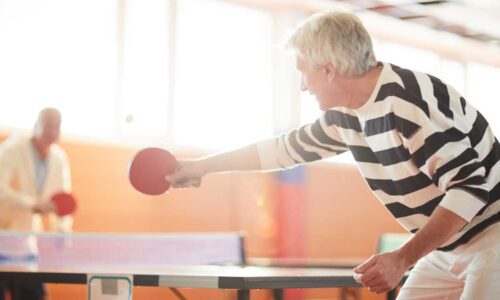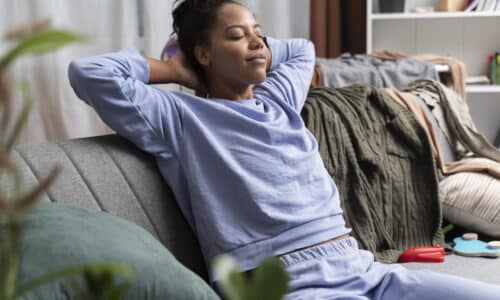
With all of the news and changes surrounding COVID-19, anyone can feel overwhelmed and anxious. Adjusting to challenges of the new recommended restrictions related to COVID-19 can be stressful. We know that some stress helps to build a stronger immune system. Too much stress can lead to a weakened immune system, promote diseases, and disrupt your behavioral health. COVID-19 has all the major elements to make our alarm bells sound. Learning healthy ways to manage stress as soon as possible can help prevent long-term troubles. I would like to offer some strategies, based on research findings, that can help you build resilience while coping with the many lifestyle changes related to COVID-19.
Tips to Help Deal With the Stress of COVID-19
Keep a structured day. Staying close to your normal schedule can be helpful for you and everyone in your household. Not having structure often contributes to anxiety in children who have grown accustomed to a daily routine. Structure provides a sense of control. However, within your routine, you can be flexible with normal rules of your household. Decide ahead of time which rules you will continue to hold firm and which rules you will allow some flexibility.
Acknowledge feelings and emotions. Expect a wide range of emotions – including sadness and anger. These are part of adapting to the challenges we are all facing.
Create A Few New Routines. Enjoy family meals together, spend quality time together as a family, or learn a new game or activity. Start a new hobby that you have been putting off until you “had time” or re-engage a hobby you have neglected.
Engage in Physical Activity. If you normally go to the gym, take advantage of online/YouTube fitness classes in your own home. This can be done individually or as a fun family activity. If you are exercising outside, remember the CDC recommended guidelines about social distancing. Consider doing a virtual/video fitness with a friend. If you have not been physically active, this could be a great time to start. Consult with a physician for guidance before you start an exercise program.
Limit media time. Stay informed while avoiding getting saturated and overwhelmed with news through multiple venues (national/local news, Facebook, Instagram, Twitter, etc.). Research finds that social media can escalate anxiety more than traditional media. As more data is gathered about COVID-19, information changes rapidly. There is also mis-information about this virus, treatments, cures, and restrictions. Negotiate with family about the specific amount of time with social media. Social science evidence shows that too much media of any kind can increase stress and anxiety.
Help younger children feel secure. Ask younger children what concerns them, instead of providing information that may be confusing. Model healthy coping behaviors, good hand hygiene and other practices recommended by the CDC, including social distancing.
Embrace Individual Differences. Although we have similar physical reactions to stress and anxiety, our psychological reactions can be very different. We all deal with anxiety in our own ways. We can use this opportunity to help those around us deal with COVID-19, and learn from others better ways to handle these uncertainties.
Reach out for behavioral health care. If you are struggling, reach out for behavioral health care. Resources for behavioral health are expanding with COVID-19. Please don’t hesitate to contact our medical team with any questions on when and how to seek reputable behavioral health care.
Allow house members social, psychological, and physical space. Each morning agree to check in with each other throughout the day.
Enjoy sunshine and fresh air. When possible, spend time outside, while avoiding crowds. Sunshine has many benefits, including improving mood. Even 10-15 minutes of sunshine can be helpful. Use sunscreen and always practice extra steps for safety.
Rise to the occasion. Reach out (calls, letters, virtual visits) to loved ones who are homebound, isolated, or self-quarantined. Too much isolation can cause you to feel disconnected and ill-at-ease, which can lead to feelings of anxiety and depression. Rekindle neglected relationships. Evidence supports that a sense of belonging builds resiliency, especially during times of increased stress.
Fight boredom. Boredom can allow your thoughts to go into places that increase anxiety and a sense of loneliness. Boredom can also lead to habits or activities to avoid – overeating, excessive consumption of alcohol. Ahead of time, write a list of activities that you can do to combat boredom. Invite family members to create their own “go to lists” as well.
Give back. Find a meaningful way to support your community, such as dropping off canned goods at donation centers or donating blood. Studies show that giving to others boosts your physical and emotional well-being.
Take One Day At a Time. In all of this uncertainty, you have an opportunity to flourish. Remind yourself that we are truly all in this together and will remain in this together until the COVID-19 crisis abates.
Resources
If you have any more questions just Ask Hanna, our health advisors are here to help.
Dr. Joseph A. Banken, PhD, Licensed Clinical Psychologist
Image: ©Shutterstock / Roman J Royce









